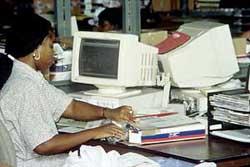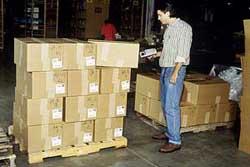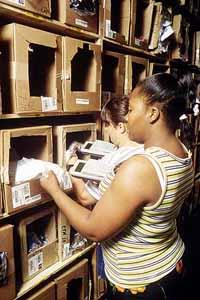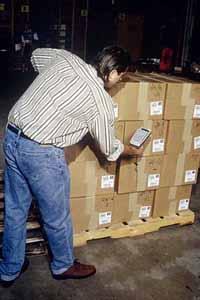- Provide a system capable of being on-line to both their current Hewlett Packard (HP9000) host running their Legacy software, as well as to their new IBM (AS/400) host running Mozart software.
- Provide full system redundancy in the warehouse, as well as future capabilities to add any remote warehouses they may acquire.
- dial-up capabilities to the RF system for remote support
- transparent swapping between redundant backbones should one fail
- guaranteed on-site service response
- 55 RF laser scanners (35 in Florida, and 20 in Georgia)
- 20 stationary barcode printers for handling returns labeling
- 6 portable printers attached to the RF laser scanners for product and shelf location re-labeling.
 COMPSEE Application Stories
COMPSEE Application Stories
Fulfillment Efficiency Pays Off
By reengineering its warehouse,
The Mark Group cuts costs and boosts service
 |
 |
 Based in Boca Raton, FL, the cataloger (which includes the Boston Proper and Mark, Fore & Strike apparel catalogs and the Atlanta-based Charles Keath gift book) has been housed in the same 80,000-sq.-ft. facility for five years. But during that time, "we've grown from a $20 million company to about $100 million in sales, Fox says. Clearly the company's fulfillment procedures were due for some fine-tuning.
Based in Boca Raton, FL, the cataloger (which includes the Boston Proper and Mark, Fore & Strike apparel catalogs and the Atlanta-based Charles Keath gift book) has been housed in the same 80,000-sq.-ft. facility for five years. But during that time, "we've grown from a $20 million company to about $100 million in sales, Fox says. Clearly the company's fulfillment procedures were due for some fine-tuning.
So after converting from hanging apparel storage to flat-pack warehousing in early 1996, The Mark Group installed a new warehouse operating system, Commercialware's Mozart, which required a computer hardware upgrade. Next, the company brought a radio frequency (RF) bar code scanning system from Compsee a barcode and data collection systems integrator, that includes 35 scanner guns and RF stations. The RF technology scans the bar codes on packages "to give us real-time inventory tracking" and eliminate the need for workers to key in changes by hand, Fox says. Key areas taking advantage of the RF barcoding systems include: Receiving, Returns, Inventory Transfers and Replenishment.
The Mark Group also sped up the rate at which goods travel through the warehouse by installing a motorized belt conveyor system that replaces a skate-wheel roller conveyor, which workers had to move manually.
 The payoff
The payoff
The Mark Group completed the reengineering in September 1996 and saw a payoff almost immediately. For starters, the efficiencies enabled the cataloger to reduce its warehouse staff 38% (about 100 people) over four months. Then, with the savings in payroll, "we increased our wages 5%, to help attract and keep good workers," Fox says.
The RF tracking system also improved inventory management accuracy. The company's "can't find" rates (when workers can't locate an item on order dropped from 14% in early '96 to less than 1%, Fox says. And the cataloger, which ships about 35,000 packages a week, also slashed its order turnaround time from nearly a week to 24 hours for 98% of all orders. Now when orders are held up, Fox says, it's often due to outside factors, such as credit card problems.
As for the bottom line, the company's operating expenses for fiscal '97 (which ends in January) are expected to be $2.1 million lower than '96 expenses. Half of the savings came from switching its parcel delivery business from Federal Express to the U.S. Postal Service, the company attributes the remaining $1.5 million in savings to the warehouse reengineering.
- By Melissa Dowling
Reprinted from: Catalog Age
January/February 1998
Background
Compsee initially met with an independent consultant retained by The Mark Group and was presented with some interesting integration challenges.
The integration challenges were further complicated due to different topology and protocol requirements originally implemented with each of the hosts.
The challenges and requirements were met and exceeded by Compsee's Systems Group along with providing the following enhancements:
With the acquisition of the Charles Keath Catalog, The Mark Group now takes advantage of:
Since the initial installation the Mark Group replaced their HP9000 with an IBM RS6000, utilizing Compsee's Systems Group for support during the transition. Having planned for this from the onset, the equipment supplied by Compsee supported all of the system changes with minimal re-investment.
© 1998 Compsee, Inc. All Rights Reserved. Please read our disclaimer.

Back to COMPSEE Application Stories
COMPSEE Home
| Corporate Profile
| Systems Solutions Group
| What's New
| Calendar
Products Specifications
| Product Pricing
| Application Stories
| Download Shareware
Contact Us...
| Information Requests
| Email Us